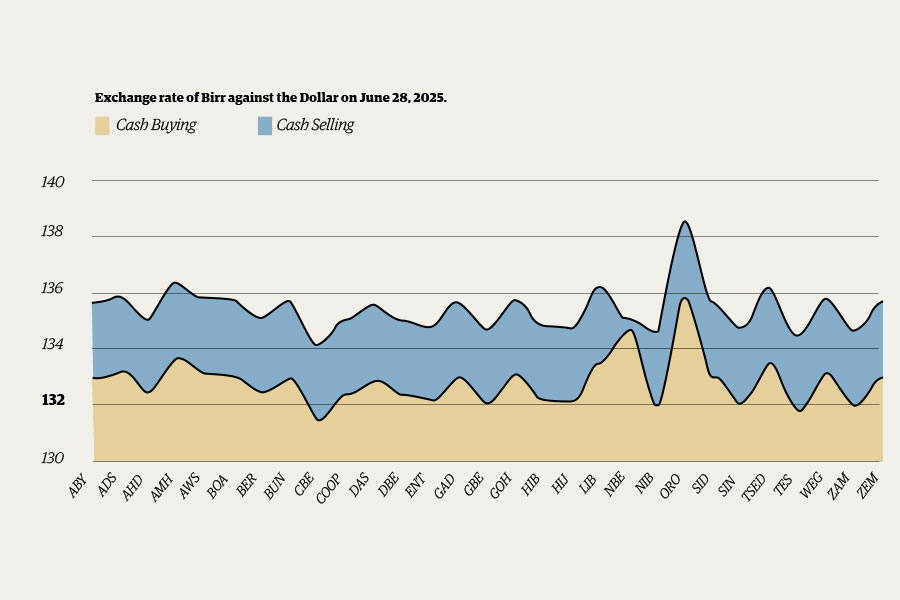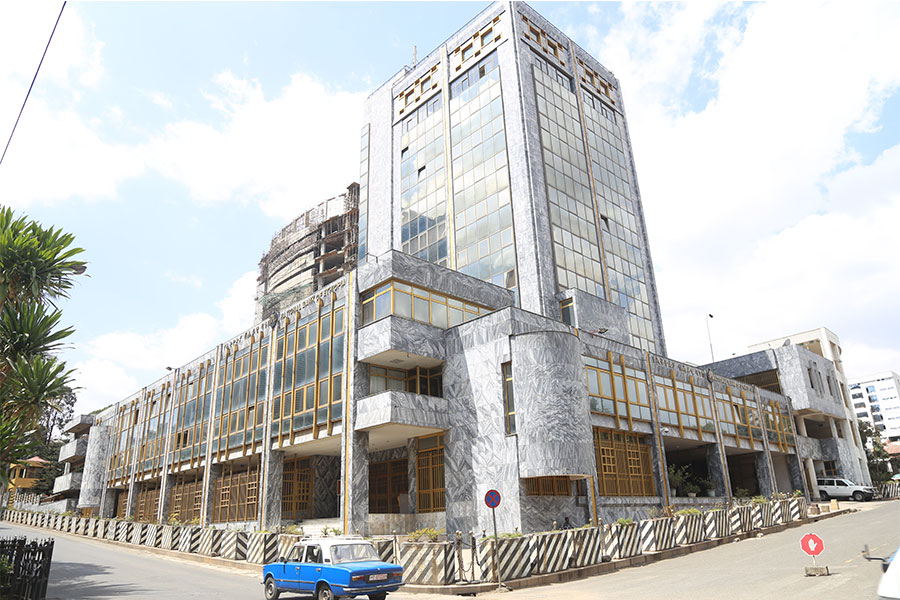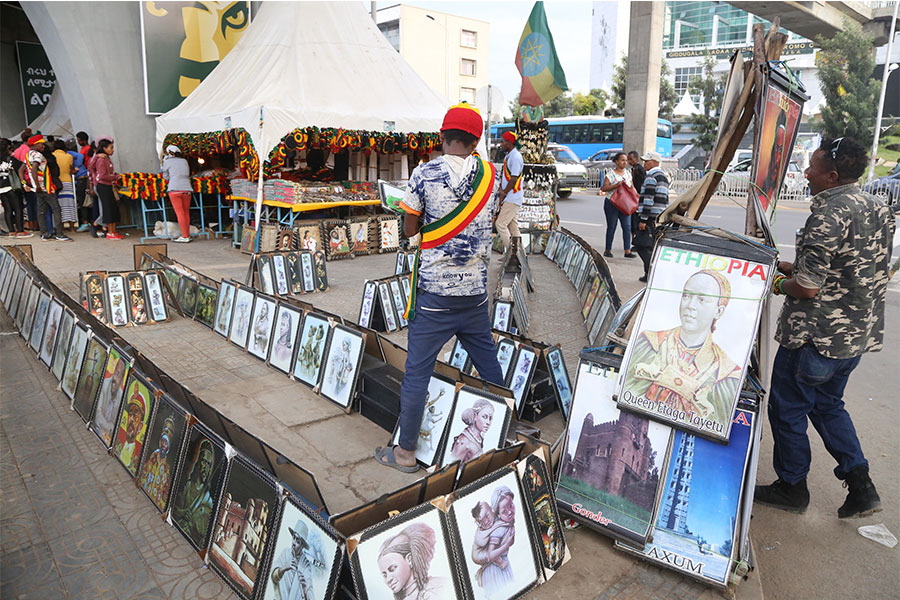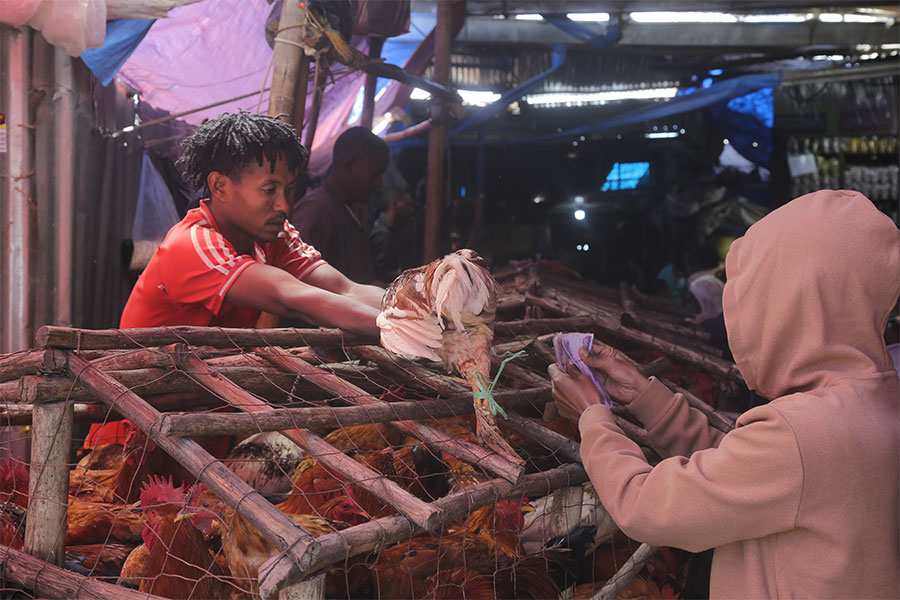
Fortune News | Jun 15,2019
On the outskirts of the capital north lies a valley surrounded by hills dubbed Asko Thrift Market. The place comes to life before the break of dawn with suppliers making their way to assume their designated wood podium. Their section (shirt, jacket, shoes) is hung with a signboard on top. Then the tender begins.
Vendors bring forth an item and raise it above their heads looking down at the crowd with potential buyers calling out prices off the top of their lungs. The quick yet chaotic scene lasts until the seller believes it has reached a good price point, announcing the win. The winner throws the agreed amount to the stage with the crumpled cloth thrown back. Buyers arrive before sunrise to get better quality and price, with a second-hand t-shirt price starting from 50 Br and rising to up to 400 Br.
The bustling mass, chattering noises and distinct smells all heighten as time passes by, keeping attendees from realising the chilly morning weather. It is possible to lose a partner one came with amidst the tumultuous crowd like a chicken cluster. However, the trained eyes of "unofficial security" on the hills, pinpoint outlaws taking advantage of the disorder.
Carrying a pile of shirts and shorts in his hands, the 31-year-old Ahmed was heading out from the market. He did not even bother to bring a bag.
"It's part of my daily routine," he told Fortune.
The father of one earns a living from selling thrift clothes by the roadside along Piassa with few price adjustments. He joined the business a year ago with 1,000 Br as it did not require much initial capital. As the sole breadwinner for his wife and daughter, he lacked the money to open a shop. Ahmed believes the reduced prices, quality products and uniqueness make second-hand clothing preferable to many.
Second-hand clothes are listed as prohibited and restricted items by the law. Yohannes Weldegebrel, a lawyer with experience in tax laws and commercial codes said it is one of the many areas the regulatory body turned a blind eye to.
Despite the ban on the import and sale of secondhand clothing, thrift shops have adamantly put their billboards and social media promotions with addresses. Near the Hayahulet area, a thrift shop stands void of competitors nearby for close to seven years. The owner Tigist was motivated to start the business after observing the high demand and few participants in the market. She gets supplies from Adama (Nazareth) or Dire Dewa cities paying half in advance.
A wide customer range is online based, she said people usually come to the shop to pick up their already paid clothes.
"Most of the displayed items are already sold," she told Fortune.
The thrift shop owner in Adama town, Selam Habtewold, commented on the quality of these clothes(thrift) being way better than brand new ones available in the market. She explained the price for a t-shirt quadruples to a minimum of 200 Br by the time it is washed and ironed, with little or no alterations, hanging on the displays looking as good as new. She said the 25-year-old opened her shop last year with most customers coming through referrals or views on social media platforms that promote her business.
"The demand is high," she said.
Close to a quarter of million stores registered clothing stores in the last two years under the Ministry of Trade & Regional Integration.
Jirata Nemera, head of licensing and regulatory at the Ministry, said there is no system that separates the license given to shops selling second-hand clothes. He believes the low capital requirement and reduced price are factors the markets are booming besides lack of regulation.
"The control mechanism is weak," Jirata said.
The chain goes back to towns such as Gedamaytu, in Afar Regional State, known for its vast thrift market. Thousands gather in the town, the corridors where goods make their way from the Djibouti ports. The location has made it ideal for contraband trade. Garments, clothing items, shoes, and electronics are sold for prices that cannot buy a decent cup of coffee in the bougie places of the capital. The suppliers lay out rather large floor coverings with piles of the products they offer. Customers are not the usual end users here but suppliers. Officials waiting at checkpoints are a major worry for the adventurous workers as they might get caught. Some try to wear all the clothes they bought reaching a point of limited movement. Others buy the clothes in bags and pass them to various cities, hidden inside trucks.
The US supplies 20pc of total direct exports of second-hand clothing to the East African market while the UK, Germany and China follow suit. The second-hand clothing import tax from the US contributed 140 million dollars to the East African countries in 2015. A study done in 2005 reveals second-hand clothes account for more than 30pc of imports and over half the volume of clothing imports to sub-Saharan countries. Its retail market is recognised as a trend in developed countries while it is used to label the low economic class in developing countries.
According to Simeneh Bessie (PhD), an economics expert at the Ethiopian Economics Association, the very nature of informal businesses create job opportunities for many as they require a low budget and provide services at low cost. He further added the sellers are well aware of the risks but ignore them to make ends meet.
"It is the economic constraints that got us here," he said.
As the second-hand clothing market creates job opportunities for many, it is a standing challenge to clothing store owners and local producers. According to the World Bank report, China is the leading country in garment supply with Ethiopia spending nearly 600,000 dollars in 2020. The United States Trade Office report indicates the US goods trade surplus stood at 442 million dollars in 2019.
The expert recommends tax incentives for importers with registered licenses that are paying taxes while policymakers curate a way for the markets to join the legal route. According to him, the tax revenue that could have been gained through the second-hand clothing market is being lost.
Clothing stores aroud the haya hulet area
PUBLISHED ON
Feb 11,2023 [ VOL
23 , NO
1189]

Fortune News | Jun 15,2019

Radar | May 20,2023

Commentaries | Nov 27,2018

Fortune News | May 25,2019

Money Market Watch | Jul 06,2025

Fortune News | Nov 30,2019

Radar | Jul 06,2025

Editorial | Nov 01,2025

Radar | Apr 26,2019

Agenda | Jan 07,2023

Dec 22 , 2024 . By TIZITA SHEWAFERAW
Charged with transforming colossal state-owned enterprises into modern and competitiv...

Aug 18 , 2024 . By AKSAH ITALO
Although predictable Yonas Zerihun's job in the ride-hailing service is not immune to...

Jul 28 , 2024 . By TIZITA SHEWAFERAW
Unhabitual, perhaps too many, Samuel Gebreyohannes, 38, used to occasionally enjoy a couple of beers at breakfast. However, he recently swit...

Jul 13 , 2024 . By AKSAH ITALO
Investors who rely on tractors, trucks, and field vehicles for commuting, transporting commodities, and f...

Nov 1 , 2025
The National Bank of Ethiopia (NBE) issued a statement two weeks ago that appeared to...

Oct 25 , 2025
The regulatory machinery is on overdrive. In only two years, no fewer than 35 new pro...

Oct 18 , 2025
The political establishment, notably the ruling party and its top brass, has become p...

Oct 11 , 2025
Ladislas Farago, a roving Associated Press (AP) correspondent, arrived in Ethiopia in...